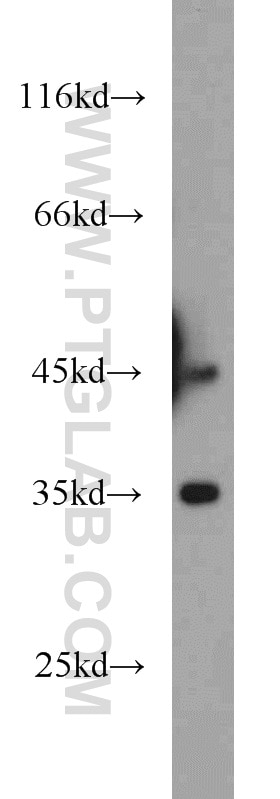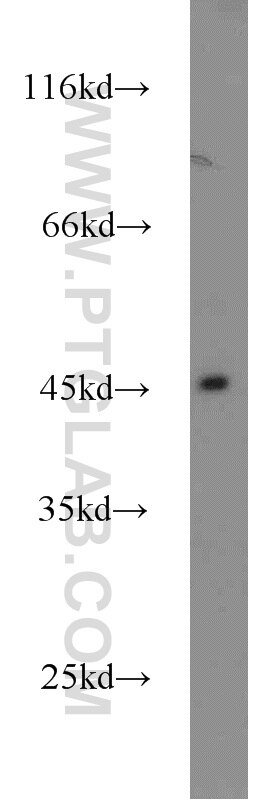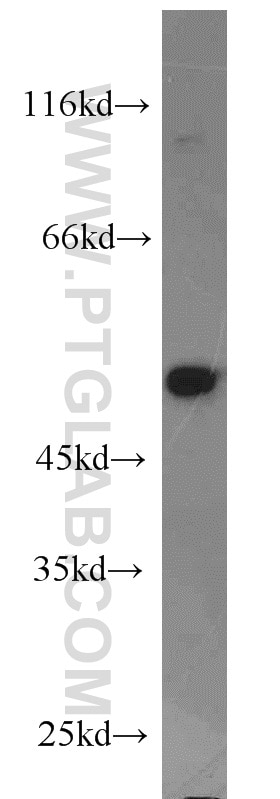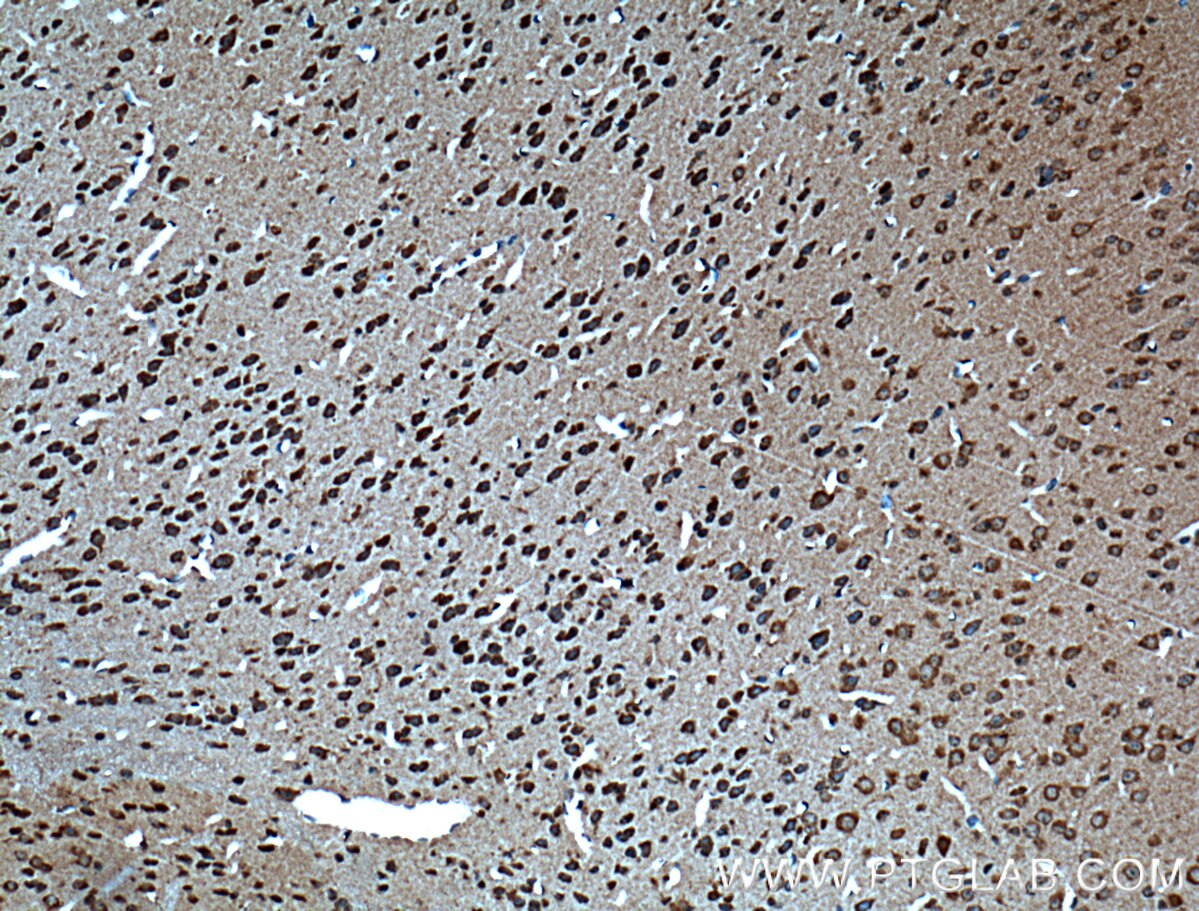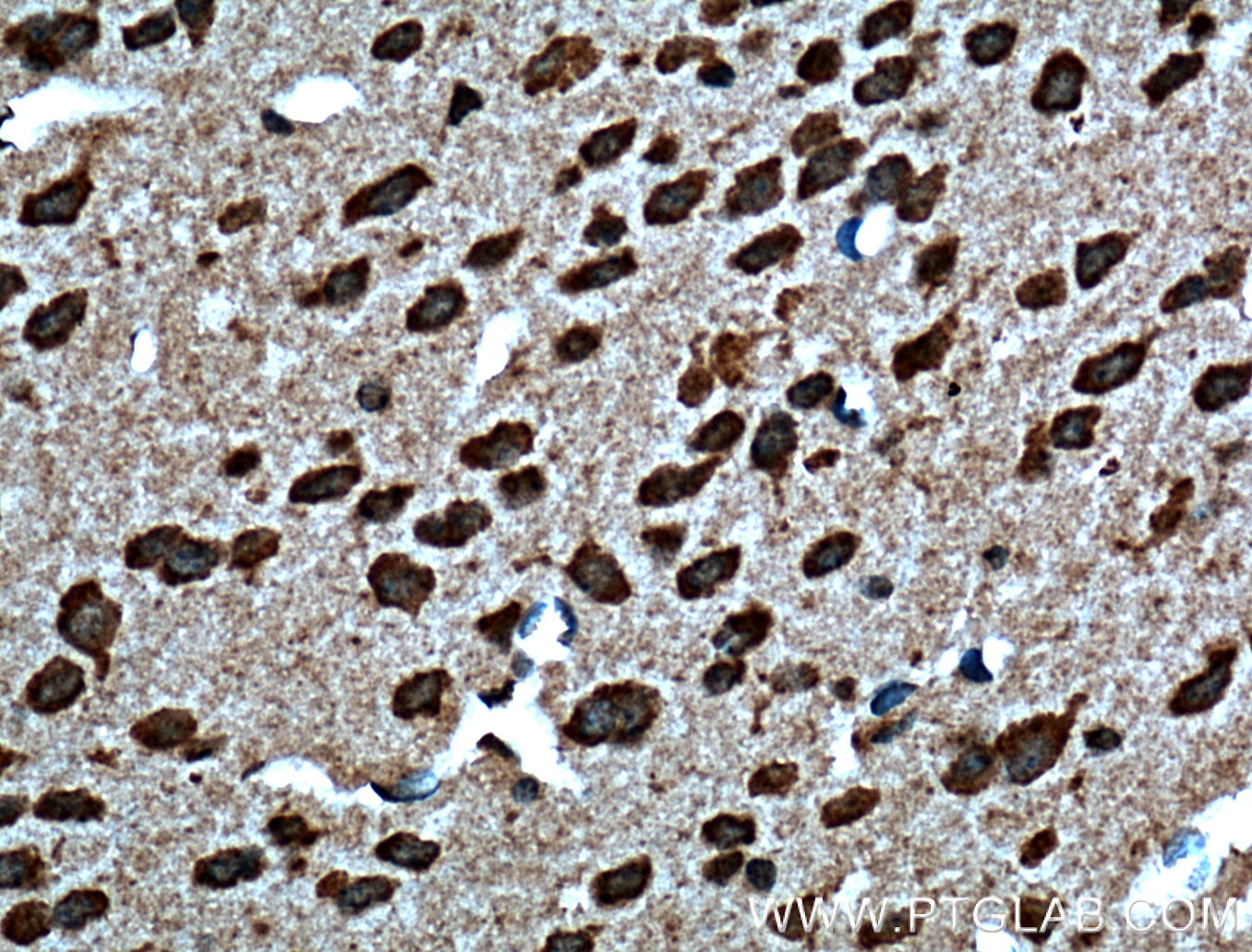Anticorps Polyclonal de lapin anti-Dysbindin
Dysbindin Polyclonal Antibody for WB, IHC, ELISA
Hôte / Isotype
Lapin / IgG
Réactivité testée
Humain, rat, souris
Applications
WB, IHC, IF, ELISA
Conjugaison
Non conjugué
N° de cat : 11132-1-AP
Synonymes
Galerie de données de validation
Applications testées
| Résultats positifs en WB | tissu cérébral de souris, tissu testiculaire de souris, tissu testiculaire humain |
| Résultats positifs en IHC | tissu cérébral de souris il est suggéré de démasquer l'antigène avec un tampon de TE buffer pH 9.0; (*) À défaut, 'le démasquage de l'antigène peut être 'effectué avec un tampon citrate pH 6,0. |
Dilution recommandée
| Application | Dilution |
|---|---|
| Western Blot (WB) | WB : 1:500-1:2000 |
| Immunohistochimie (IHC) | IHC : 1:50-1:500 |
| It is recommended that this reagent should be titrated in each testing system to obtain optimal results. | |
| Sample-dependent, check data in validation data gallery | |
Applications publiées
| WB | See 7 publications below |
| IF | See 1 publications below |
Informations sur le produit
11132-1-AP cible Dysbindin dans les applications de WB, IHC, IF, ELISA et montre une réactivité avec des échantillons Humain, rat, souris
| Réactivité | Humain, rat, souris |
| Réactivité citée | rat, Humain, souris |
| Hôte / Isotype | Lapin / IgG |
| Clonalité | Polyclonal |
| Type | Anticorps |
| Immunogène | Dysbindin Protéine recombinante Ag1613 |
| Nom complet | dystrobrevin binding protein 1 |
| Masse moléculaire calculée | 351 aa, 39 kDa |
| Poids moléculaire observé | 48 kDa, 36 kDa |
| Numéro d’acquisition GenBank | BC011912 |
| Symbole du gène | Dysbindin |
| Identification du gène (NCBI) | 84062 |
| Conjugaison | Non conjugué |
| Forme | Liquide |
| Méthode de purification | Purification par affinité contre l'antigène |
| Tampon de stockage | PBS with 0.02% sodium azide and 50% glycerol |
| Conditions de stockage | Stocker à -20°C. Stable pendant un an après l'expédition. L'aliquotage n'est pas nécessaire pour le stockage à -20oC Les 20ul contiennent 0,1% de BSA. |
Informations générales
Dysbindin, encoded by DTNBP1 (dystrobrevin binding protein 1), is a synaptic protein which is expressed in diverse neuronal populations throughout the brain. Genetic variation in DTNBP1 is associated with schizophrenia. Reduced expression of dysbindin has been reported in the dorsolateral prefrontal cortex (DLPFC) of schizophrenia cases. Several isoforms of dysbindin exist: 48-50 kDa of dysbindin-1A, 35-38 kDa of dysbindin-1B, and 30-32 kDa of dysbindin-1C. This antibody recognizes all of isoforms of dysbindin. (19617633)
Protocole
| Product Specific Protocols | |
|---|---|
| WB protocol for Dysbindin antibody 11132-1-AP | Download protocol |
| IHC protocol for Dysbindin antibody 11132-1-AP | Download protocol |
| Standard Protocols | |
|---|---|
| Click here to view our Standard Protocols |
Publications
| Species | Application | Title |
|---|---|---|
Sci Total Environ TRIM24-DTNBP1-ATP7A mediated astrocyte cuproptosis in cognition and memory dysfunction caused by Y2O3 NPs | ||
J Cell Biol BLOC-1 is required for selective membrane protein trafficking from endosomes to primary cilia. | ||
Am J Respir Cell Mol Biol Gene-edited MLE-15 Cells as a Model for the Hermansky Pudlak Syndromes. | ||
Neuropharmacology Mice with dopaminergic neuron-specific deletion of DTNBP-1 gene show blunted nucleus accumbens dopamine release and associated behaviors. | ||
Neuroscience Protein kinase B/Akt1 phosphorylates dysbindin-1A at serine 10 to regulate neuronal development. | ||
Br J Pharmacol Dopaminergic signaling and behavioral alterations by Comt-Dtnbp1 genetic interaction and their clinical relevance |
